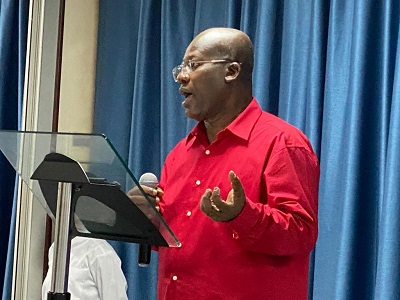
Operationalise the National Research Fund Act - Prof. Yirenkyi Danquah to govt
The Founder of the West Africa Centre for Crop Improvement (WACCI), University of Ghana, Professor Eric Yirenkyi Danquah, has appealed to the government to as a matter of urgency operationalise the National Research Fund Act.
He expressed the concern that even though the National Research Fund Act has been assented by President Akufo-Addo, it has not be operationalised to benefit the country’s agriculture.
He explained that the operationalisation of the National Research Fund Act would help contribute to efforts in meeting Sustainable Development Goal 2, which aims to achieve zero hunger.
Prof. Danquah made the appeal when he addressed guests at the “Sustainable Dinners: World Hunger Day Dinner” in Accra last Sunday, May 28, 2023.
Sustainable Dinners: World Hunger Day Dinner
The "Sustainable Dinners: World Hunger Day Dinner" were held simultaneously in some selected Global South countries to serve as platforms for launching a campaign to establish a commemoration day for farmers who apply innovative agricultural biotechnologies to accelerate the elimination of hunger by 2030.
Similar dinners were held on the same day in Nairobi, Kenya, Abuja, Nigeria, Lusaka, Zambia, Cairo, Egypt, Dhaka, Bangladesh and Guatemala.
The event was also used to honour some farmers and key players in the agricultural value chain, including seed breeders for their various contributions towards ending hunger in the country and the world as a whole.
Implementation of National Research Fund Act
Prof. Danquah expressed the hope that the implementation of the National Research Fund Act would serve a key catalyst in promoting technologies and innovations to drive self-reliance agriculture in the country.
For him, the National Research Fund Act would facilitate “impact-driven research to build resilient and robust food systems to meet SDG 2 by 2030 under, a Presidential Initiative on Food and Nutrition Security to be coordinated from the Office of the President with the Ministries of Education, Environment, Science, Technology and Innovation and Finance” as the main coordinating units.
In addition, he observed, “If only we would do this well with the evidence available, we would sustainably take this country forward in the next four years and we would be on track toward meeting SDG 2 with far reaching positive ramifications on about nine other SDGs.”
Prof. Danquah said it was within the possibility of science and technology to make agriculture more productive and sustainable, hence the need to prioritise agricultural research.
“Together, we possess the ability to make a difference. Through collaborative efforts and innovative solutions, we hold the power to eradicate hunger and establish a world where everyone has access to nutritious food. It is an arduous task, but one we must confront head-on,” he explained.
He urged all relevant stakeholders to play their part in the battle against hunger, saying “Let us pledge to raise awareness, support initiatives that promote sustainable agriculture, empower communities, and advocate for policies that prioritize food security.”
Celebrate farmers
The Executive Director, Alliance for Science, Dr Sheila Ochugboju, in her remarks commended farmers for their instrumental role in providing food to feed the world.
She said farmers everywhere deserved to be praised for their commitment and dedication to feed the world’s growing populations.
“Farmers should be praised and prayed for,” she noted, commending Ghana for already celebrating its farmers in the annual National Farmers Day.
Dr. Ochugboju expressed the hope that with commitment and political will, it was possible to end hunger in the country and across the world, pointing out that hunger threatens everyone and that many people were food insecure in the world.
Adopt technology
The Deputy Minister for Food and Agriculture, Mr. Yaw Frimpong Addo, said considering the fertile nature of the country’s lands, there was no need for anyone to go hungry in the country.
He said with the use of technology and innovations, the country would be food secure, explaining that many farmers in rural areas of the country were food insecure because they were not applying technology and innovation in their work.
Mr. Addo said science and technology were needed to turn around the country’s agriculture, saying “We need scientists to improve our agriculture.”
